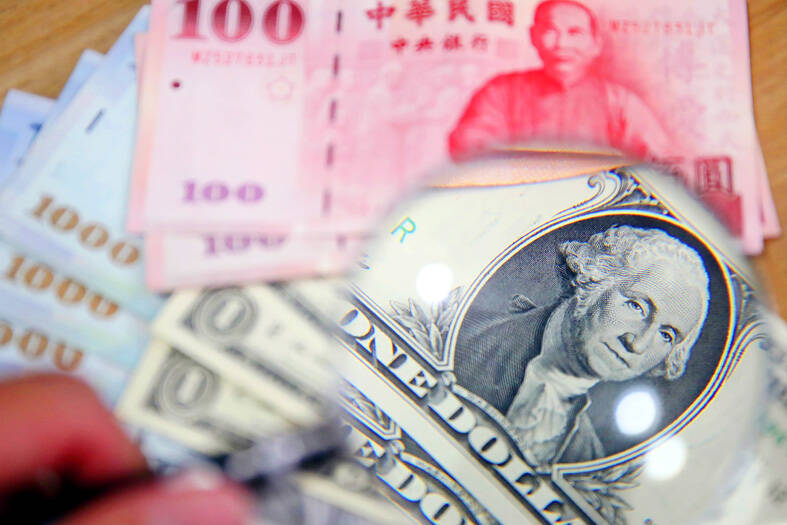Taiwan has been kept on a monitoring list of currency manipulation by the US government in its semi-annual report on the Macroeconomic and Foreign Exchange Policies of Major Trading Partners of the United States.
In the latest report submitted to the US Congress on Tuesday, the US Department of the Treasury said it found that no major US trading partner has manipulated exchange rates to get an unfair competitive edge in international trade during the four quarters through June.
However, Taiwan remained on the watch list for currency manipulation, as did China, Malaysia, Germany and Singapore, while Vietnam was added to the list, the report said.

Photo: CNA
The trading partners analyzed in the report accounted for about 78 percent of US foreign trade in goods and services, the department said.
In the previous semi-annual report released in June, Taiwan, China, South Korea, Germany, Malaysia, Singapore and Switzerland were on the watch list.
The report uses three criteria to determine if a trading partner should be named a currency manipulator. They are: having a trade surplus with the US of at least US$15 billion; having a current account surplus of at least 3 percent of GDP; and persistent intervention in the foreign exchange market, with net purchases of foreign currency of at least 2 percent of GDP.
A trading partner that meets all three criteria can be tagged a currency manipulator, but if it meets only one of the three criteria for two reports in a row, it can be removed from the monitoring list.
Taiwan met the trade surplus and current account surplus criteria, but “foreign exchange intervention was limited in the first half of 2023, consistent with muted currency movements,” the report said.
It advised Taiwan to “deploy a careful mix of policies that better insulate the economy from external shocks and address structural issues to reduce external sector imbalances,” especially in terms of diversifying its energy imports.
It also said Taiwan’s “foreign exchange intervention should be limited and allow currency movements in line with economic fundamentals.”
“Most foreign exchange intervention by US trading partners over the Report period was in the form of selling dollars, actions that served to strengthen their currencies,” US Secretary of the Treasury Janet Yellen said in a statement.
“However, Treasury remains vigilant to countries’ currency practices and the [US President Joe] Biden Administration strongly opposes attempts by the United States’ trading partners to artificially manipulate currency values to gain unfair advantage over American workers,” Yellen said.
The report also called for greater transparency from China, saying its failure to disclose foreign exchange interventions and its lack of transparency on key features of its exchange rate mechanism made it an outlier among major economies and warranted close monitoring.

Hon Hai Precision Industry Co (鴻海精密) yesterday said that its research institute has launched its first advanced artificial intelligence (AI) large language model (LLM) using traditional Chinese, with technology assistance from Nvidia Corp. Hon Hai, also known as Foxconn Technology Group (富士康科技集團), said the LLM, FoxBrain, is expected to improve its data analysis capabilities for smart manufacturing, and electric vehicle and smart city development. An LLM is a type of AI trained on vast amounts of text data and uses deep learning techniques, particularly neural networks, to process and generate language. They are essential for building and improving AI-powered servers. Nvidia provided assistance

DOMESTIC SUPPLY: The probe comes as Donald Trump has called for the repeal of the US$52.7 billion CHIPS and Science Act, which the US Congress passed in 2022 The Office of the US Trade Representative is to hold a hearing tomorrow into older Chinese-made “legacy” semiconductors that could heap more US tariffs on chips from China that power everyday goods from cars to washing machines to telecoms equipment. The probe, which began during former US president Joe Biden’s tenure in December last year, aims to protect US and other semiconductor producers from China’s massive state-driven buildup of domestic chip supply. A 50 percent US tariff on Chinese semiconductors began on Jan. 1. Legacy chips use older manufacturing processes introduced more than a decade ago and are often far simpler than

STILL HOPEFUL: Delayed payment of NT$5.35 billion from an Indian server client sent its earnings plunging last year, but the firm expects a gradual pickup ahead Asustek Computer Inc (華碩), the world’s No. 5 PC vendor, yesterday reported an 87 percent slump in net profit for last year, dragged by a massive overdue payment from an Indian cloud service provider. The Indian customer has delayed payment totaling NT$5.35 billion (US$162.7 million), Asustek chief financial officer Nick Wu (吳長榮) told an online earnings conference. Asustek shipped servers to India between April and June last year. The customer told Asustek that it is launching multiple fundraising projects and expected to repay the debt in the short term, Wu said. The Indian customer accounted for less than 10 percent to Asustek’s

Gasoline and diesel prices this week are to decrease NT$0.5 and NT$1 per liter respectively as international crude prices continued to fall last week, CPC Corp, Taiwan (CPC, 台灣中油) and Formosa Petrochemical Corp (台塑石化) said yesterday. Effective today, gasoline prices at CPC and Formosa stations are to decrease to NT$29.2, NT$30.7 and NT$32.7 per liter for 92, 95 and 98-octane unleaded gasoline respectively, while premium diesel is to cost NT$27.9 per liter at CPC stations and NT$27.7 at Formosa pumps, the companies said in separate statements. Global crude oil prices dropped last week after the eight OPEC+ members said they would